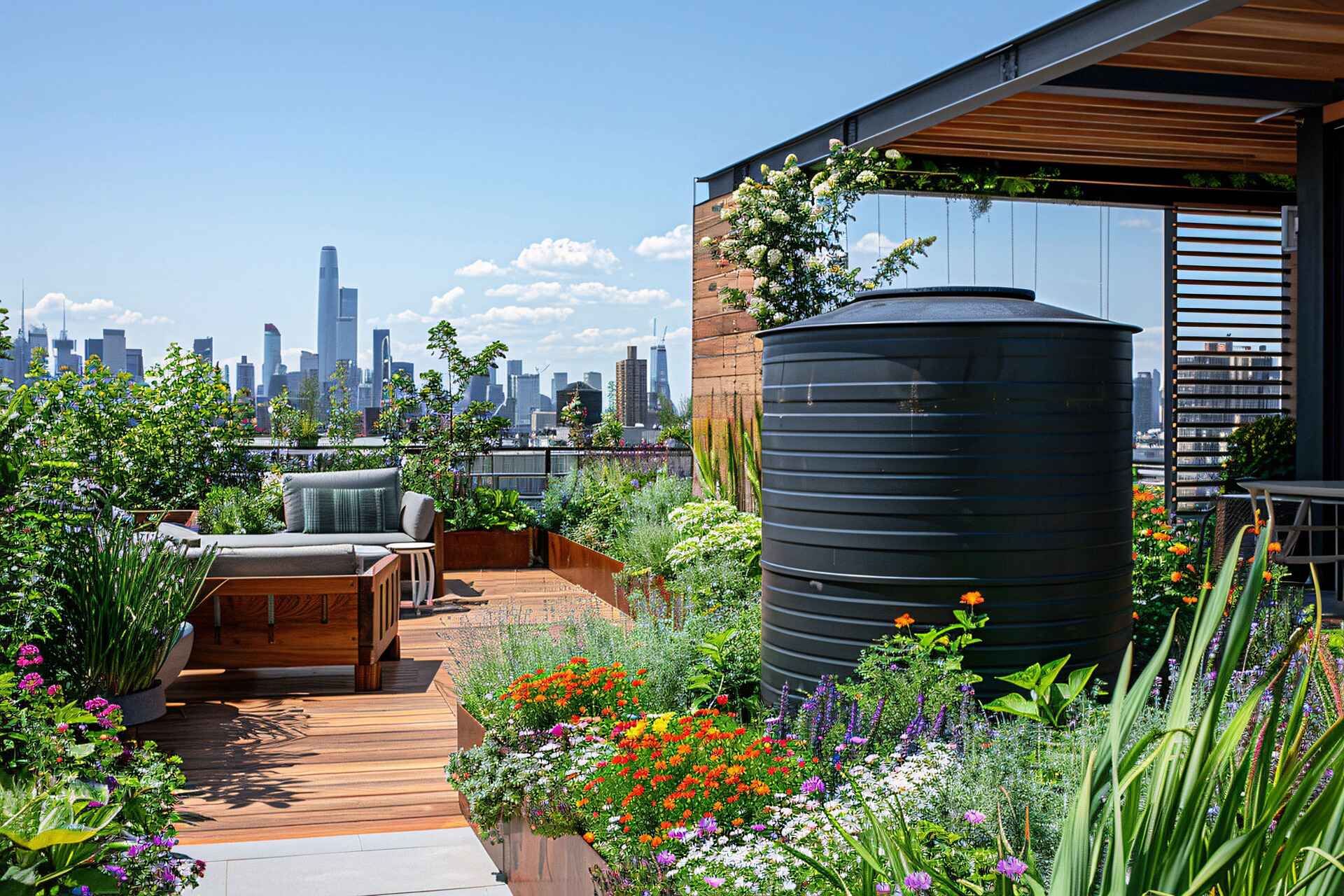Benefits of Sensory Gardens: Boosting Mind and Body Wellness
Learn about the benefits of sensory gardens, from reducing stress to enhancing well-being, and what makes them ideal green spaces for people of all ages.
.webp)
Sensory gardens offer a wide range of benefits, including therapeutic benefits for people of all ages, benefits for children with special needs, and general health and well-being benefits. Overall, spending time in a sensory garden can have a huge positive impact on your mental health.
Sensory gardens are a wonderful combination of nature and sense stimulation.
These outdoor green spaces are designed to engage all five senses. These include sight, sound, smell, touch, and even taste.
This is achieved through carefully selected plants and elements.
They're becoming more and more popular because of their unique ability to calm the mind.
Sensory gardens are filled with plants, textures, sounds, and scents. They create immersive experiences that appeal to people of all ages and abilities.
In this article, we'll discuss the many benefits of sensory gardens. These benefits include mental health improvements, educational opportunities, and social interactions.
Children, adults, seniors, and people with special needs can enjoy them. Sensory gardens offer something for everyone.
Therapeutic Benefits of Sensory Gardens
Any garden or green space can offer therapeutic benefits. Sensory gardens are designed with these benefits in mind.
They do so by engaging the senses in a natural, calming environment.
Sensory gardens are more than just visually pleasing.
They use a mix of plants, textures, scents, and sounds to create a holistic experience. By doing so, sensory gardens can help with:
- Reducing stress and anxiety
- Memory stimulation
- Socialisation and cognitive function

Reducing Stress and Anxiety
One of the key benefits of sensory gardens is their ability to reduce anxiety and stress.
Imagine walking into a garden filled with soothing sounds and calming scents. This natural environment is designed to calm the nerves.
It's incredibly beneficial for people with anxiety or depression.
Sensory gardens use calming elements to reduce stress and anxiety. For example:
- Fragrant plants (lavender, chamomile, rosemary, thyme, jasmine, etc.)
- Soothing sounds (water fountains and wind chimes)
- Soft and varied textures (lamb's ear or moss)
- Quiet zones for peaceful solitude
Visitors can unwind, manage stress, and experience a natural sense of calm.
Scent plays a powerful role in emotional response.
Some plants have natural relaxing properties that can lower cortisol levels. For instance, lavender can relieve symptoms of stress and anxiety.
Even natural sounds can soothe the mind. In a sensory garden, these could be fountains, waterfalls, or bubbling rocks.
These gentle sounds promote relaxation and mask urban noise. They help encourage mindfulness and mental rest.
Being in nature has been shown to lower cortisol levels.
Sensory gardens also make nature more accessible. They offer these soothing benefits to people of all ages.
Memory Stimulation
Sensory gardens can also help with memory stimulation. This is done by triggering positive memories.
Sensory gardens can be incredibly therapeutic for those with cognitive decline or Alzheimer's.
Familiar smells can trigger forgotten memories, providing comfort and nostalgia.
Scent is closely linked to memory and emotion. That's because the olfactory bulb is directly connected to the brain's memory centres.
These green spaces also encourage exploration. Doing so can help keep the mind active and engaged.
This therapeutic stimulation aids memory retention and cognitive health.
Engaging textures can help improve tactile memory as well.
People can interact with plants and materials with varied textures. This can help reinforce sensory memory.
That's why a sensory garden might include soft lamb's ear, bumpy pinecones, or smooth stones.
Recognisable plants and colourful flowers help stimulate visual memory.
Familiar flowers or trees can bring back memories. These memories could be related to gardening, past homes, or favourite outdoor spaces.
Socialisation and Cognitive Function
Other sensory garden benefits include the opportunity to socialise and improve cognitive function.
These gardens act as community spaces. People can gather, chat, and engage in gardening activities.
This is especially important for seniors who need to stimulate their cognitive function. Spending time in sensory gardens can help them maintain memory and mental agility.
Of course, sensory gardens are for people of all ages.
By bringing people together in a relaxed, natural setting, sensory gardens help:
- Maintain social connections
- Reduce feelings of isolation
- Provide opportunities for conversations and shared experiences
Many sensory gardens offer structured activities as well. These could include group planting, garden tours, or guided sensory explorations.
These activities encourage cognitive engagement and cooperation.
Benefits for Children with Special Needs
Sensory garden benefits also apply to children with special needs. They provide a safe, therapeutic environment tailored to their sensory needs.
For children with special needs, spending time in sensory gardens can lead to:
- Sensory stimulation and motor skills improvement
- Emotional and psychological well-being
- Cognitive and educational benefits
- Social interaction and communication

Sensory Stimulation and Motor Skills
Children, particularly those with special needs, can benefit from sensory gardens.
These spaces engage the senses through a mix of textures, colours, and sounds. All these elements support sensory processing skills.
Stepping stones or balance beams can help improve motor skills through play.
Sensory gardens are designed to engage different senses at the same time. This is especially important for children with:
- Sensory processing disorders (SPD)
- Autism spectrum disorder (ASD)
- Attention deficit hyperactivity disorder (ADHD)
- Intellectual and developmental disabilities
- Physical disabilities
Sensory gardens offer textures to touch, scents to smell, and sounds to hear. Children can practice processing sensory input in a controlled setting.
Emotional and Psychological Well-Being
Just as for seniors, sensory gardens provide a refuge for children to relax. Sensory gardens are especially useful for children struggling with stress and anxiety.
A sensory garden is a place where kids can let go of their worries. They can build emotional resilience in a safe environment.
Sensory gardens offer calming scents and soothing sounds. This natural setting can create a relaxing atmosphere.
This environment helps minimise anxiety and overstimulation. These conditions can be common in children with special needs.
Sensory gardens provide a tranquil space for children to self-soothe. They allow them to feel safe and alleviate anxious behaviours.
This is helpful for children who may feel overwhelmed in more traditional settings.
These green spaces may even help children learn how to express themselves. The soothing environment allows them to explore feelings in a safe way.
Cognitive and Educational Benefits
Sensory gardens serve as incredible educational tools. They are interactive and offer hands-on learning opportunities.
Through sensory gardens, children can:
- Learn hands-on about the life cycle of plants
- Discover the uses of herbs for cooking
- Explore nature through interactive, multisensory engagement
This presents learning without the constraints of a traditional classroom. It also offers sensory concepts through direct experience.
This can be very important for children with cognitive or learning disabilities.
Sensory gardens create a dynamic, tactile learning environment. Abstract concepts can become more concrete and accessible.
This type of hands-on learning can improve understanding and retention.
Sensory gardens can even improve focus in children.
They can do so by encouraging mindfulness and attentiveness through interactive elements. For instance, children can observe bright flowers, touch leaves, or follow pathways.
These activities gently guide children's focus in a non-demanding way.
Social Interaction and Communication
Social skills bloom in sensory gardens. Children can engage in guided or free play with peers and adults.
The natural setting encourages communication and cooperation. These are key components in developing social awareness and friendships.
Sensory gardens also encourage exploration and discovery. This often sparks interest and conversation.
Group activities, such as planting or guided sensory explorations, encourage children to communicate.
They also get to interact with peers or caregivers.
Some children have social or communication difficulties. For instance, those on the autism spectrum.
They can enjoy these low-pressure opportunities to build social skills.
Practising social interaction in a sensory garden helps build confidence. It also leads to better communication in a supportive environment.
General Health and Well-Being Benefits of Sensory Gardens
Sensory gardens also come with some advantages related to health and well-being. That's what makes them beneficial for everyone.
These include a range of physical, mental, and emotional advantages.
Sensory gardens provide a holistic approach to health and well-being.
They offer a restorative space. They promote physical activity, mental clarity, emotional balance, and social connection.
The main general health and well-being benefits of sensory gardens include:
- Better mood
- Reduced stress
- Physical fitness

Improved Mood and Reduced Stress
We've all experienced that fresh feeling after spending time in nature.
Sensory gardens take it a step further. They combine natural beauty with sensory stimulation.
That's why they can improve your mood and reduce symptoms of depression and stress.
Sensory gardens create a calming environment. This space is filled with natural elements, soothing scents, and gentle sounds.
Together, these elements help lower stress levels and promote relaxation.
Spending time in nature is known to lower cortisol levels and improve mood. It provides a break from the demands of daily life.
Engaging with a sensory garden can also improve mental well-being. This happens through encouraging mindfulness and grounding.
It's all about the immersive sensory experience. It can help people focus on the present moment.
This, in turn, can minimise feelings of anxiety and depression.
Physical Fitness
Gardens aren't just about sitting back and enjoying the view. They encourage light physical activity.
Walking through a sensory garden promotes gentle physical activity. Even activities like tending to plants or engaging with interactive elements can help.
This movement helps improve flexibility, strength, and cardiovascular health.
It's especially beneficial for older adults or individuals with limited mobility.
Digging, planting, or simply walking around boosts both gross and fine motor skills.
Tasks like watering plants or light weeding offer a fun way to add movement to daily routines.
This promotes physical well-being. Plus, it's a fun way for both children and adults to stay active and healthy.
Exploring Sensory Garden Benefits
Sensory gardens are more than just green spaces. They provide the opportunity to relax and stimulate your senses.
These gardens offer therapeutic benefits that support mental, emotional, and physical health.
They're for people of all ages and abilities. It doesn't matter if you're a senior looking to reconnect with nature or a child ready to explore. These gardens are worth visiting.
Find a local sensory garden and discover how it can improve your health and well-being.
If you're interested in building a sensory garden, Evergreen Infrastructure can help make it happen.
As green space experts, we specialise in designing innovative green infrastructure in urban environments. From therapeutic landscapes to green roofs, we can help you bring greenery closer to you.
Contact us if you want to know more.
{{cta}}
We create green oases in urban settings
We'd love to discuss how we can partner to bring innovative, sustainable solutions to your urban environment.
.webp)
.webp)
.webp)


